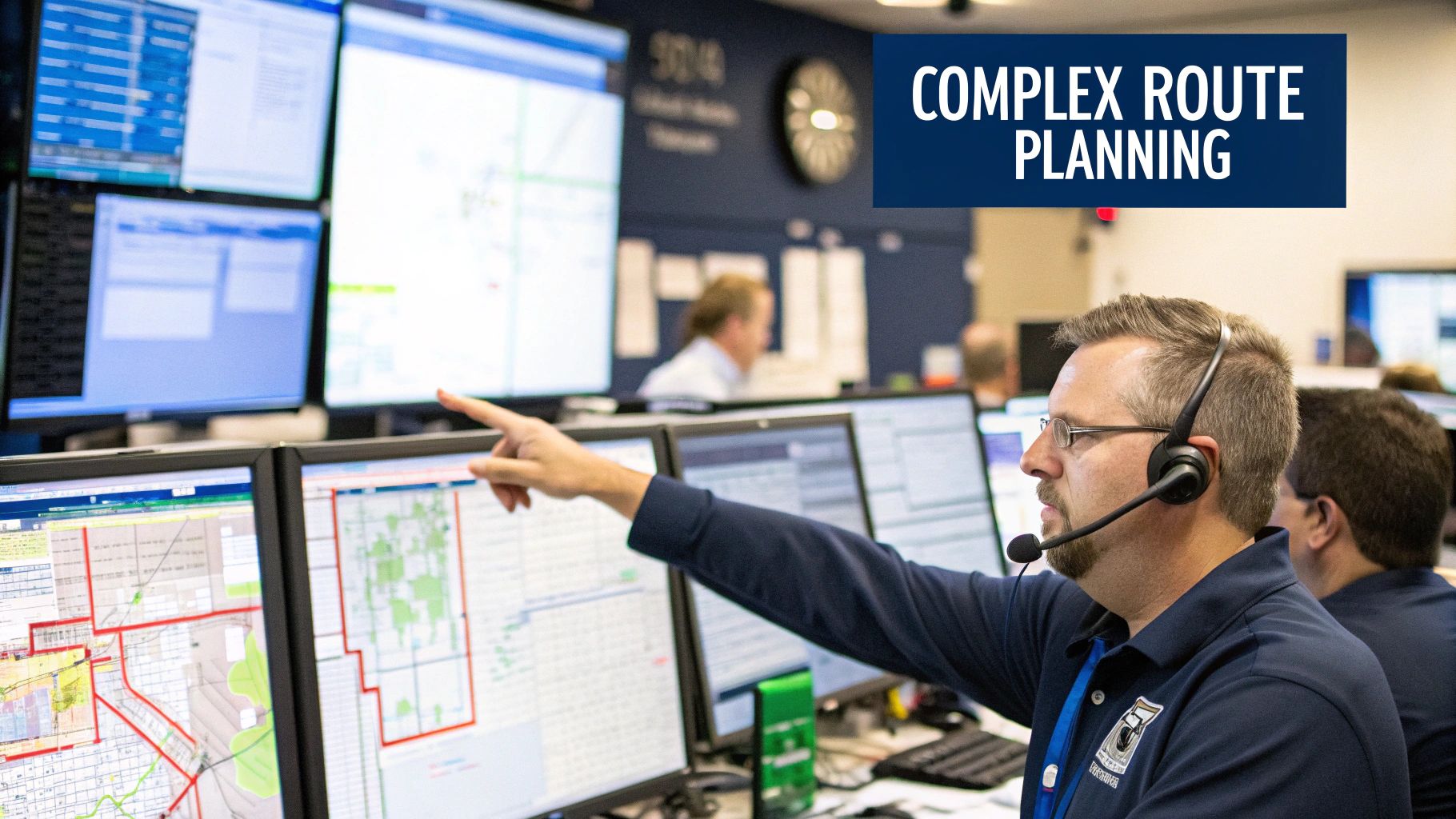Dispatcher Trucking Salary: What You Can Make, Based on Experience
Ever wonder what the person on the other end of the radio is making? A good dispatcher is the heart of any trucking company. But the dispatcher trucking salary can change a lot depending on the job. It's not just about telling you where to go. It's about knowing the market, planning good routes, and keeping the whole operation making money.
If you're a driver thinking about a job off the road, this guide is for you. It breaks down what you can expect to earn. We'll look at different jobs, from starting out to running your own dispatch service. Let's get to it.
1. Entry-Level Truck Dispatcher
Starting as an entry-level dispatcher is your first step. In this job, you'll handle the basics. You'll coordinate loads, talk with drivers, and plan simple routes. This is where you learn the ropes. Your starting dispatcher trucking salary will be on the lower end, but it's a launchpad for making more money as you get experience.
What the Job Looks Like
An entry-level job is all about learning. Small trucking companies often hire new dispatchers to help manage their trucks. Big freight brokers might have training programs to teach you their systems. The key is to soak up everything you can.
Key Tip: Your first goal isn't just to do the job. It's to become a good problem-solver. Every load you track and every driver you help is a chance to show what you can do.
How to Get Hired
To get a job and do well, you need to show you're ready.
- Mention Customer Service: If you've worked in a store or call center, say so. Dispatching is all about talking to people.
- Learn the Lingo: Know basic trucking terms like "bill of lading," "deadhead," and "HOS" (Hours of Service).
- Handle the Pace: The job is fast. Show you can handle pressure and think on your feet.
- Be a Good Communicator: Practice being clear and to the point. Good communication prevents big mistakes on the road.

2. Experienced Freight Dispatcher
As an experienced dispatcher, you're a key part of the team. You manage tough routes and handle many drivers at once. You might specialize in profitable loads like hazmat or oversized freight. You can solve problems quickly, so your dispatcher trucking salary is much higher. You are trusted to make big decisions that affect the company's money.

What the Job Looks Like
At this level, your value comes from being efficient and knowing your stuff. You’re not just booking loads. You’re building good lanes and strong relationships. Companies count on you to cut down on empty miles, get better rates, and keep drivers happy. Knowing how much drivers make helps you work better with them. Explore truck driver salaries to see their side of things.
Key Tip: Your skills make the company money. The more you save on fuel, repairs, and keep good drivers around, the more you're worth.
How to Make More Money
To get a bigger salary and move up, show off your best skills.
- Track Your Wins: Keep a record of how you've saved the company money. Use these numbers when you ask for a raise.
- Find a Niche: Become an expert in one type of freight, like reefer or flatbed. Special skills get you higher pay.
- Build Your Network: Get to know good drivers and brokers. A strong network makes your job easier and more profitable.
- Keep Learning: Stay up to date on new rules, market changes, and dispatching software.
3. Independent Dispatcher/Owner-Operator Services
Becoming an independent dispatcher means you're the boss. You work for yourself, finding good loads for owner-operators and small fleets. Instead of a set salary, you get a percentage of each load. This means your pay depends directly on how well you do. A good dispatcher trucking salary here depends on your skills and who you know.
What the Job Looks Like
Running your own dispatch service is about building a business. Many successful independent dispatchers start by finding clients while they still have a job. Then they go out on their own. Your job is to be a partner to the owner-operators you work with.
Key Tip: Your value is finding drivers better rates and more steady work than they can find themselves. You’re not just a dispatcher; you’re a key partner in their success.
How to Start Your Own Business
To build a successful dispatch business, you need a good plan.
- Build a Network First: Start making connections with owner-operators and brokers before you quit your day job.
- Use Good Contracts: Have clear contracts that lay out your fees and what you'll do. This protects you.
- Find Quality Drivers: Work with reliable drivers you can trust to handle loads right.
- Get Good Tools: Use professional dispatch software and load boards to stay organized and find the best freight.

4. Large Fleet Dispatcher
Working for a large fleet means you're part of a huge operation. You'll coordinate for giants like Schneider or J.B. Hunt. You'll manage hundreds of drivers and complex routes. This is a big step up. Your dispatcher trucking salary will be higher to match the responsibility, and you'll often get better benefits.
What the Job Looks Like
In a large fleet, your job is less about one truck and more about managing a whole system. You'll use advanced software and follow company rules. Big carriers rely on these dispatchers to plan the best routes, stay compliant, and make the most money across their entire network.
Key Tip: To succeed here, you have to master the company's systems. Being able to work in a big, structured company is key.
How to Get a Job at a Big Company
To get a job with a major carrier, you need to show you can handle the size.
- Show Your Software Skills: Mention any experience with big transportation management systems (TMS).
- Talk About Safety: Highlight what you know about safety rules and HOS. Big companies care a lot about their safety record.
- Be a Team Player: Talk about how you can work with a team and other departments.
- Mention Your Experience: If you've managed a growing fleet before, make sure to bring it up. Show you can handle a lot at once.

5. Specialized Freight Dispatcher
Moving into specialized freight means you handle cargo that needs extra care and planning. This could be oversized loads, hazardous materials (hazmat), or refrigerated goods. These loads have more risks and rules. Because of that, a specialized dispatcher trucking salary is much higher to match the extra work.
What the Job Looks Like
Specializing makes you an expert in a high-demand field. Companies that move chemicals or heavy machines need dispatchers who know the rules inside and out. Your job isn't just to book a truck. It's to make sure every detail, from permits to the driver's training, is perfect. This makes you a huge asset and boosts your pay.
Key Tip: Specializing turns you into a risk manager. Your job is to prevent costly fines, delays, and accidents that others aren't trained to handle.
How to Specialize
To get paid more, you need to be the go-to expert.
- Get Certified: Get certifications for your specialty, like for hazmat or oversized loads.
- Master the Rules: Study the specific rules for your type of freight. For example, learn the FMCSA rules for securing loads.
- Network with Special Drivers: Build relationships with drivers who have the right endorsements and experience.
- Stay Updated: Rules change. Keep an eye on updates from the DOT and other agencies to stay ahead.
6. Dispatch Manager/Supervisor
Climbing to a dispatch manager or supervisor role means you've reached the top. You'll oversee a team of dispatchers and make strategic plans for the fleet. This leadership job combines your dispatching experience with management skills. This means you have the highest dispatcher trucking salary potential.
What the Job Looks Like
As a manager, your job shifts from handling loads to managing people. You'll train new dispatchers, set goals, and solve big problems. Managers at trucking companies focus on the big picture: efficiency, cutting costs, and keeping customers happy.
Key Tip: Your success is now measured by your team's success. A great manager builds a strong team that makes the company more money.
How to Become a Manager
To move into a leadership role, you need to show you can do more than just dispatch.
- Be a Leader: Take charge of projects and help new hires. Show you can guide a team.
- Focus on Performance: Learn how to track numbers, manage reviews, and give helpful feedback.
- Understand the Money: Get familiar with budgets and how to look at operating costs.
- Make Things Better: Show you can find ways to save money or improve routes. This makes you a very valuable employee.
So, Is a Dispatcher Career Your Next Move?
A dispatcher trucking salary isn't just one number. As you've seen, there's a wide range of what you can make. Your pay is tied to your experience, the type of freight you handle, and the job you choose.
Your pay grows with your skills, whether you're just starting out, building your own business, or leading a team. For those willing to learn, the path from a good starting salary to a six-figure income is clear.
Here's the most important thing to remember: the skills that make you a great driver also make you a great dispatcher.
- You Understand Routes: You know the roads, traffic, and how long it really takes to get somewhere.
- You're a Good Communicator: You know how to talk to drivers, brokers, and customers to get the job done.
- You're a Problem-Solver: You've dealt with delays, truck problems, and bad weather on the road.
Learning these skills isn't just about getting an office job. For owner-operators, these skills mean more profit. For company drivers, it opens doors to new careers off the road. Understanding the dispatcher role helps you take control of your career. The dispatcher's desk might be the best next step for a driver looking for growth and a new way to use their road smarts.
Ready to start your journey in the trucking world or take the first step towards a new role? The foundation of any successful career in this industry begins with a solid CDL. ELDT Nation provides the FMCSA-approved online theory training you need to get your commercial learner's permit quickly and affordably. Build your career from the ground up by visiting ELDT Nation today.



%20Endorsement%20%E2%80%93%20Online%20Theory%20Aligned%20With%20FMCSA%20Rules.jpg)



